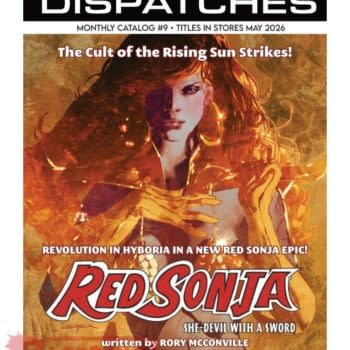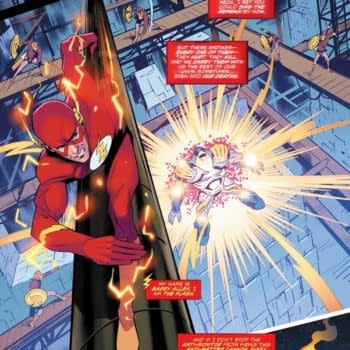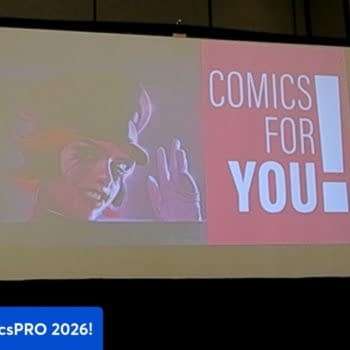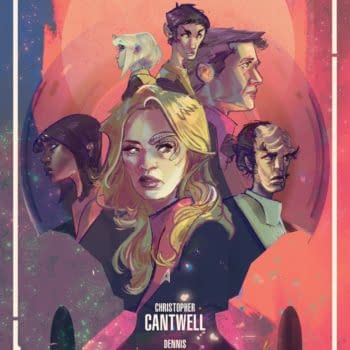Posted in: Comics, Recent Updates | Tagged: Comics, Concrete Park: R-E-S-P-E-C-T, dark horse comics, entertainment, Erika Alexander, Tony Puryear
You'd Better Show Concrete Park Some R-E-S-P-E-C-T This September – Talking With Erika Alexander And Tony Puryear, Plus 9 Page Preview
By Hilton Collins
All right, Bleeding Coolers, you'd better get ready and get your asses in gear, quick and in a hurry, because next week, the first issue of the five-part limited series Concrete Park: R-E-S-P-E-C-T drops on September 3rd from Dark Horse Comics. It's an action-packed sci-fi tale about exiles fighting for their lives and a sense of purpose on another planet—and that's not even half of what the story's about.
We caught up with series creators, the husband and wife team of Erika Alexander and Tony Puryear, two movie and TV pros who've made the jump to comics with this latest story, for an interview. Alexander's famous for her sitcom work, portraying Cousin Pam on The Cosby Show and eccentric lawyer Maxine Shaw on Living Single, and Puryear wrote the screenplay for the Arnold Schwarzenegger action film Eraser. They're writing Concrete Park together, and Puryear's also illustrating the series.
R-E-S-P-E-C-T's debut next month will mark the first time Concrete Park's been released as a full-length serial. Storylines have previously been offered as strips in Dark Horse Presents, to critical acclaim. They featured people of color struggling in a harsh urban environment, and even though that was future sci-fi, the situation mirrored many of the same struggles people of color face on Earth today, like isolation, segregation, and persecution. Houghton-Mifflin Harcourt selected Concrete Park as one of the Best American Comics of 2013, and Alexander and Puryear want to continue delivering the same thought-provoking, action-packed drama with R-E-S-P-E-C-T.
Alexander's spoken to Bleeding Cool in the past about her and Puryear's long journey to getting Concrete Park into print. More than a decade ago, they pitched a live-action sci-fi story with a Black cast to a Hollywood executive who rejected them specifically because the characters weren't white, and that motivated the creators to adapt a storyline for comics, a medium with fewer barriers to entry. Learning and adjusting to this new field and connecting with Dark Horse was an arduous, years-long process.
They're ready today. R-E-S-P-E-C-T's release is just around the corner, and the couple has made the rounds at multiple conventions to promote it and discuss the entertainment industry in general. Alexander even sat on the famous Black Panel last month at San Diego Comic-Con, sporting a Thor-style headband, and she spoke at length about the Black experience in entertainment.
She and Puryear spoke to Bleeding Cool this summer about what we can expect from R-E-S-P-E-C-T. In the limited series' first issue, hero Isaac crosses paths with gang leader Luca fresh after being exiled to the harsh planet Oasis from Earth. The name "Oasis" is a cruel joke, however, because it's a scorching environment with two blazing suns and no natural vegetation, and Isaac's expected to mine it for natural resources as a slave along with other exiles. His transportation ship unexpectedly crash lands and kills most of the passengers, and he's suddenly caught between battling gangs who'd already been trying to kill each other before he showed up as a distraction amid the ship's wreckage.
Hilton Collins: Your story takes place in the future, but you're exploring things in the present that aren't typically explored in mainstream media comfortably, like race relations, racial stereotypes, and same-sex relationships. Do you think your storytelling decisions could inspire others to be less afraid to explore these things in their own stories?
Erika Alexander: We didn't get into comics, or showbiz for that matter, expecting to carry the flag as civil and social advocates. We created Concrete Park because we thought we had an interesting story to tell and we wanted to see it realized. [Co-Founder] Mike Richardson of Dark Horse comics gave us a platform to tell our story and we're glad to be here. Nevertheless, the fact is that racism is a pernicious, invisible deterrent to change in showbiz and its underlying, psychological structure influences executives' choices. There's already a fear factor in show biz that makes studios recycle patterns from previous successes. They rarely produce projects that don't fit specific molds. You ask if they will be less afraid to explore new ground if we are successful? Perhaps. We certainly hope that will be the outcome. There's a wealth of talented people out there creating fantastic projects. All we can do is try to make a great comic. If our path helps smooth the way for other storytellers, right on.
HC: You said before that five issues, while great, is challenging to tell a Concrete Park story with because you've got so many characters and things going on. Are you already planning where you'll go with your next five-issue miniseries, or do you and Tony have a wait-and-see attitude about things before you start writing again?
EA and Tony Puryear: This is a big sucker. We're building an epic, a fictional world on the scale of Game of Thrones. Our story has wars, betrayals, love, ghosts and aliens, heroes who turn to villains, and deserts that bloom. Our larger road map is already laid out and right now we're writing. We're always writing.
HC: Can you tease what we'll see in R-E-S-P-E-C-T? Where things will take the characters?
EA / TP: In previous installments, we've crash-landed in the desert on an alien world with our hero, Isaac, and encountered Luca, a beautiful gang leader. R-E-S-P-E-C-T takes them—and us—to town, as Isaac gets a crash course in life in Scare City. His resolve not to fight will be tested, he'll meet enemies and allies, and with Luca, he'll find that in this strange new world, love is the most dangerous thing of all.
HC: In one of the Dark Horse Presents strips, Luca says that there aren't many ways to be a woman in Concrete Park, if I recall correctly. What are you going to explore about gender roles and gender politics in your series?
EA: Tony and I have very long conversations, sometimes heated, about the women in Concrete Park. The culture in comic books largely presents women as objects—tits n' ass with brass knuckles. We have a little bit of that in our comic, but we're trying to find a balance between the visuals and portraying them as full actors. The women we admire are very much women, and they carry big sticks. It's an axiom that future-set sci-fi is about today, but we mean to show things that will have changed. Yes, gender complexity and fluidity of the sexes is part of our big, hairy world.
HC: Erika, you mentioned in a previous interview that, like Australia was for British exiles and criminals, Concrete Park is a penal colony that becomes home for its residents. But today, Australia is its own country and no longer a penal colony. Has history given away what's going to happen with Concrete Park's characters? Will they, one day, turn Oasis into a literal Oasis where they stand on their own independent of any other place? Or am I reaching here?
EA: We certainly hope so. All societies have aspirations. Our world will bleed and bloom.
TP: That's not a reach. Our characters are never going home. This is home now, here on this barren rock. Godot is not coming, and they will have to deal. Whether they'll survive even five issues in this harsh environment is an open question.
HC: And since you've been inspired, in large part, by history with your story, I wanted to talk about aliens that are indigenous to Oasis. If they're living there first, and all these other people come there who aren't from there, will you make some kind of comparison to the Native American experience, or the Aborigines'? Or even, the experience of Caliban in the Tempest before Prospero comes and kind of "claims" the island as his own when Caliban didn't feel had the right?
EA: Yes, those are great examples. Love the Shakespeare Tempest reference. Yes. Silas carries the story burden of defending and avenging his land and people. His methods will be that of a person who has been occupied and marginalized on his own planet. He will act accordingly. It won't be pretty. It never is.
HC: When creating your characters, did you have certain historical figures, celebrities, or fictional characters in mind?
EA: Isaac is the quintessential western hero. He rides into town out of nowhere to find he can't stay neutral. Though he's forsworn violence, he'll have to choose sides and act. Isaac is the new pair of eyes in town, an audience surrogate who's discovering this strange new world. Luca has already adapted to this conflict-filled situation, with fatalism, with alcohol, and she's at home with the violence. And yet she's one of the most sensitive, human characters in the story. Of course, these two share a serious attraction. Of course, this is bad news.
TP: In creating these characters, I was influenced to a degree that surprised me by the vivid characters I met in 19th Century novels. I think specifically of Flaubert's Emma Bovary. She's a mess, but she's us, a very recognizably human mess. From Huck to Miss Havisham, from Ahab to Kurtz, I'm fascinated by messed-up characters who don't know why they do what they do, only that they must do it.
HC: R-E-S-P-E-C-T comes out in September, which is close. How are you feeling about that coming up? Nervous, excited, hopeful?
EA: I'm thrilled. Too much water under the bridge to be nervous. It's taken so long to get to this point. We'll be relieved and happy to have feedback from an audience.
TP: I'm nervous, but I feel very, very proud to have come this far.
HC: On the Black Panel at Comic-Con, you had on a kind of Thor helmet. Did you think to wear that in light of the recent news that Thor is a woman? What do you feel about the representation of female superheroes in comics?
EA: I wore the Thor hair jewelry because it was on sale at BCBG! I love Thor. It was my dad's favorite comic book. It's cool they are re-imagining her as a female. Women in comics have a mixed history just like in real life. I believe that the world is changing because so many women are now creators. Men have played a very big role in changing the landscape. Many have evolved to acknowledge their mothers, sisters and daughters as full participants in the human experience and not just as jewelry or trophies, hair or otherwise.
HC: If you could write any superhero or villain, male or female, who would it be or why?
EA: Of course, Usagi Yojimbo, Hellboy, Superman, and Vampirella as played by Laverne Cox [of Orange is the New Black].
TP: No question, Jack Kirby's Fourth World characters. If I had to pick just one, I'd still make it two, Mister Miracle and Big Barda, my favorite couple in the comics.
HC: So many comics are the inspiration for movies or TV shows now, and you originally wanted to make a live-action sci-fi story starring people of color to begin with. Are you hoping that your book will lead to a Concrete Park TV show of some kind? You mentioned before, Erika, that shows like Orange is the New Black are successful on Netflix. Could Concrete Park find itself on Internet or cable TV, where there are fewer creative limitations?
EA: Yes, yes and yes. Why not? There are always limitations in art. Money and budgets are the biggest, but we're used to doing more with less. Tony always says, "Black show-biz gives you more."
TP: TV is a natural extension of the big-world storytelling we're doing. Right now, TV, particularly cable, is the biggest, best sandbox there is for world-building. Serialized drama trades on the most important tool in the writer's box, suspense: what's going to happen next? We live to make this question crucial, and to answer it in as compelling a fashion as possible.
HC: Tony, what inspired you to learn to illustrate, as you did with Concrete Park? What was your visual artist's journey like? I'd imagine many writers would find the task of learning to draw well enough to illustrate a comic pretty daunting. Did you go into it cold and learn from scratch, or had you drawn before in the past as well?
TP: I had artist parents, and I always drew a little. I was an avid Marvel Comics reader as a kid and met my idol, Jack Kirby (I lived for his work on FF, Thor, and his Fourth World) when I was in high school. I majored in art at Brown [University], loving Gauguin but doing very indulgent, Morris Louis-inspired color field paintings. I say all this to say I didn't go into drawing comics cold, just near-cold. Once I decided to draw Concrete Park, my learning curve went straight up, and has been climbing ever since. It's an exciting challenge, as each new thing I have to draw for the story (wrinkles and folds in clothing! cars! action!) is something I'm attempting for the first time, and each new technique I'm learning (inking! coloring! lettering!) is also right there on the page, rookie mistakes and all. Like Isaac, I'm new here.
Be sure to check out Concrete Park on September 3rd in Dark Horse Presents!
And here's our 9 page preview courtesy of Dark Horse Comics:
Writer and videographer Hilton Collins loves sci-fi and fantasy wherever he finds it, whether it's in comic books, movies, books, short stories, TV shows, or video games. On the video side, he studies filmmaking, motion graphics, and animation; and on the writing side, he covers what he loves for Bleeding Cool and on his own blog, Imagination Unplugged (www.imaginationunplugged.com), a website about entertainment and self-help for creative professionals. He is @HiltonCollins on Twitter.



























